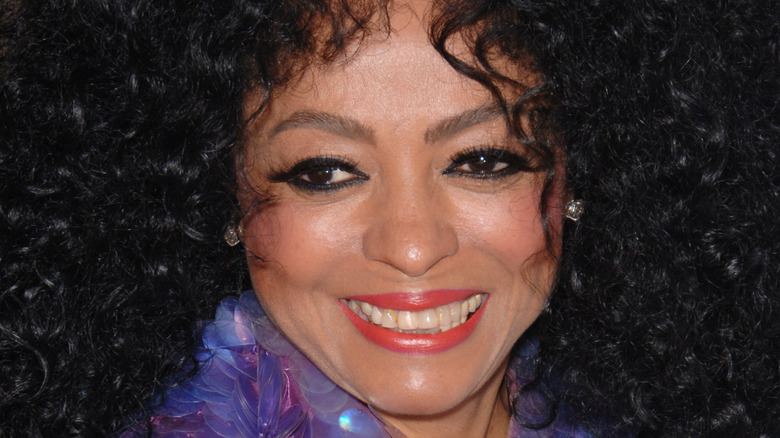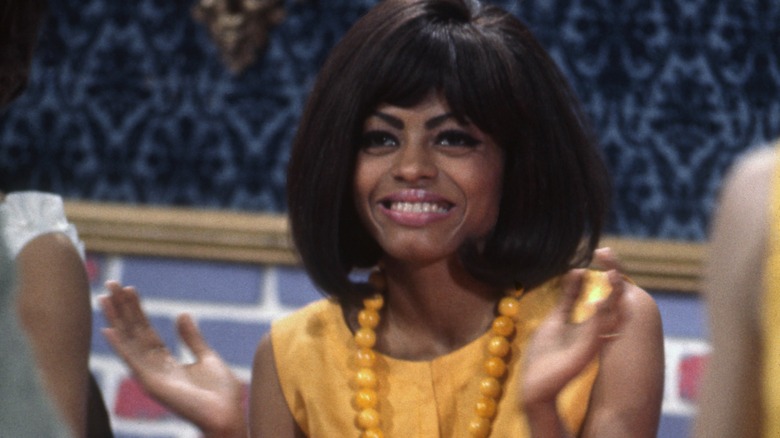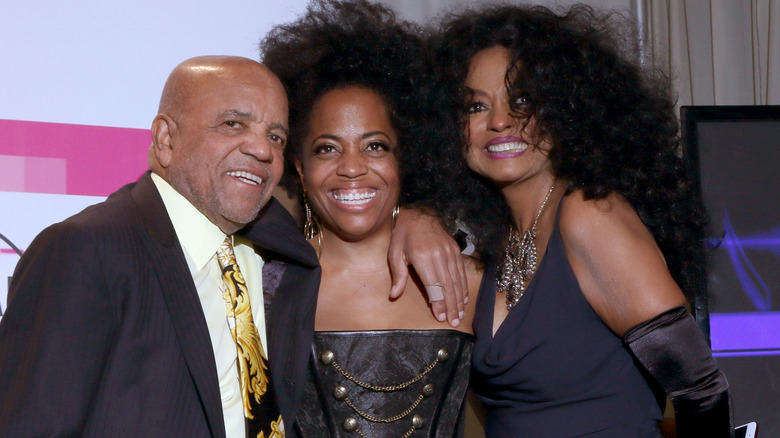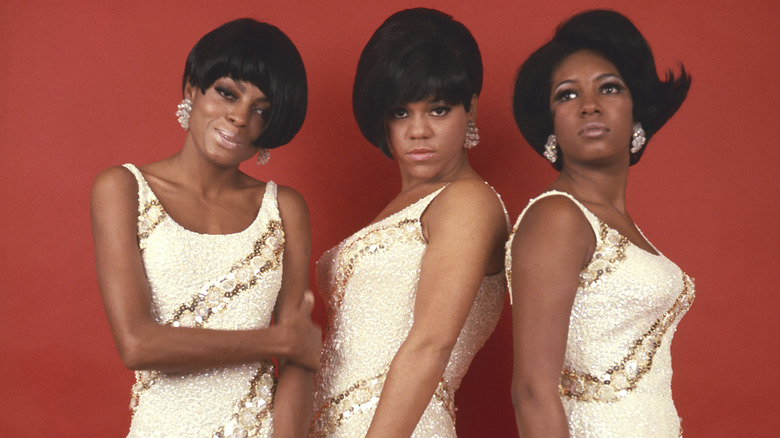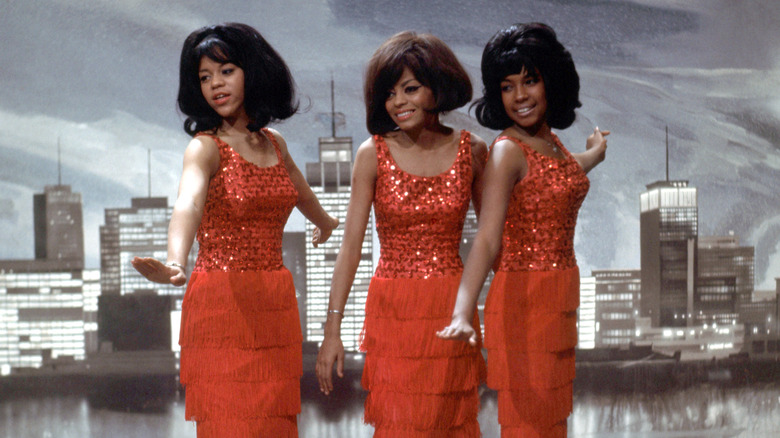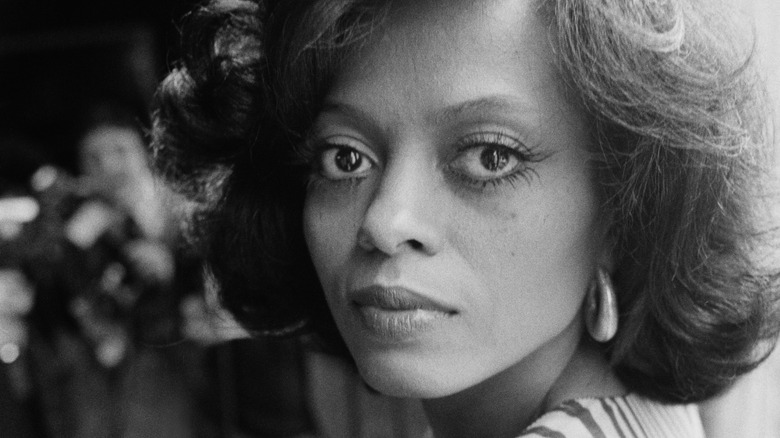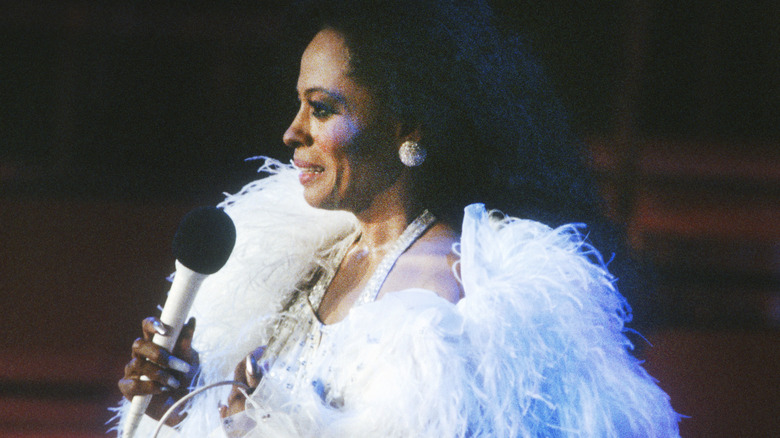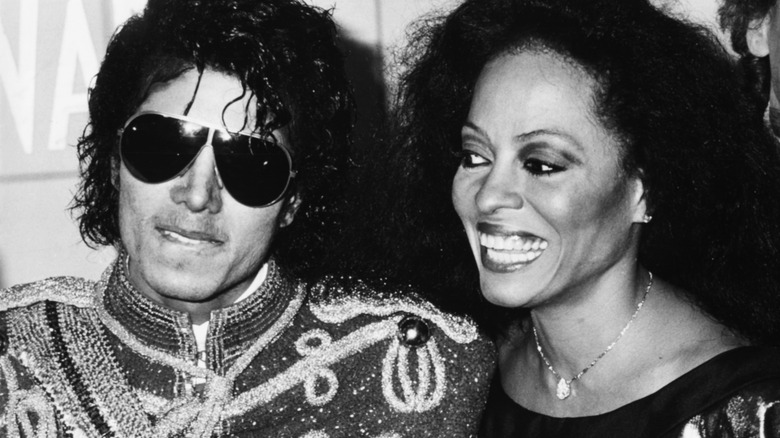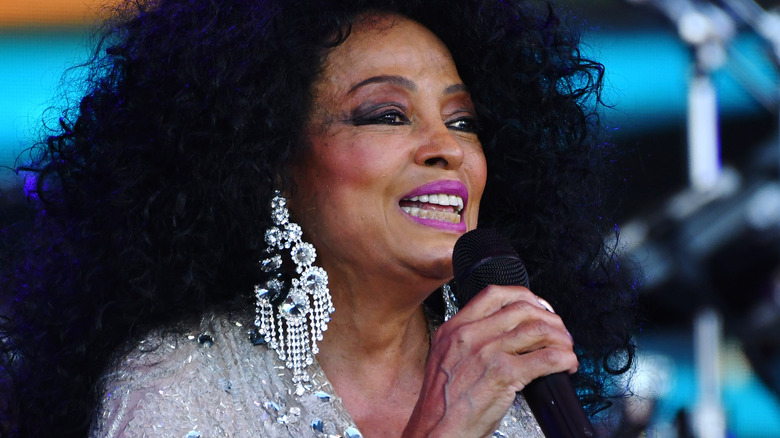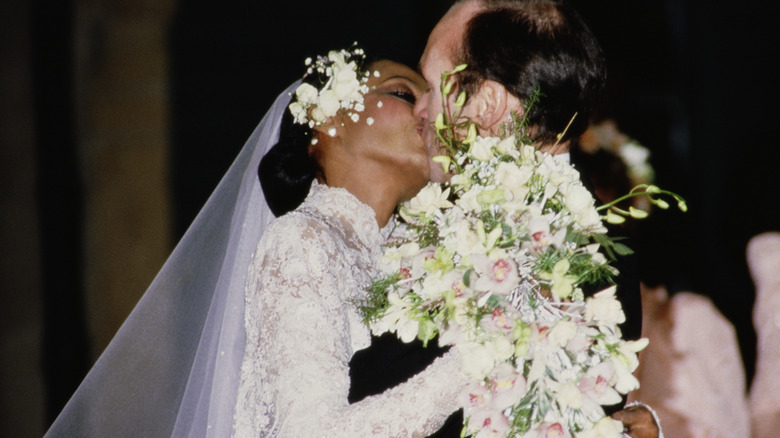The Tragic Real-Life Story Of Diana Ross
First, there was the Primettes. Then, the Supremes. Then, there was Diana Ross and the Supremes. And then? Then, it was just Diana Ross.
It's not an exaggeration to say that Ross has had a spectacular career. Even by the numbers, it's staggering: The Detroit Historical Society says that she's sold more than 100 million records, recorded 57 different albums, and had a slew of number-one hits and awards to go with them.
Diana Ross started out singing in school, with a group of neighborhood girls who got together to form an all-female counterpart to the local, all-male group the Primes. (They would later change their name, too: They would have their own series of hits as The Temptations.) They got the attention of Smokey Robinson, who set them on the path to their own recording contract. And Diana Ross? She may have never looked back, but others definitely fell by the wayside. The other two Supremes — Florence Ballard and Mary Wilson — recalled a Ross who was always trying to set herself apart from the rest of the group, whether it was by standing on the opposite side of the stage, or ditching her part of their would-be matching costumes ... just before they went on stage (via The Telegraph). Still, there's no denying that Ross was a force to be reckoned with: She knew what she wanted and she went for it, but it wasn't an easy road to travel.
She had a traumatic experience with death at a young age
Born and raised in Detroit's Brewster-Douglass Projects, Diana Ross came from an area of the country that also gave birth to stars like The Temptations and Smokey Robinson (via the Detroit Historical Society). In her memoirs, "Secrets of a Sparrow," Ross remembered that, at times, it was a great place to be a kid. She recalled playing outside with her siblings — who she loved in a fierce sort of way — and the other kids on the block. But then, on one night she called "A Wailing Night," her idyllic childhood was forever changed.
Ross recalled a young mother, sitting on the front steps of their building, crying alone in the darkness. She had just lost her children — friends of Ross's — in a horrific way: They had been playing with another neighborhood boy, when they became trapped in an old, abandoned refrigerator. They were dead by the time they were found.
Ross wrote about laying in bed, listening to their mother's grief. It was the first time she knew anyone who had died, and she wrote, "As a kid myself, all I could think about was how long it took for them to die, if they screamed and if it hurt very much. I still don't like to think about it. It remains a part of the memories of my childhood ... a phantom that long after the building was demolished still lives on."
Her relationship took a backseat to fame
For some, success comes early — and it certainly did for Diana Ross, who was still in school when she got her first meeting with the man who would be credited with inventing Motown. That, says The Telegraph, was Berry Gordy, who insisted that the group change their name. (Ross reportedly hated the "Supremes," which was Florence Ballard's choice — she claimed it wasn't feminine enough). That was in 1960. Fast forward seven years, and Ross and Gordy had become much more than friends — a relationship change that happened right before they officially became Diana Ross and the Supremes.
When Gordy spoke with Vanity Fair in 2008, he called working with her "just like heaven," saying, "It's very clear why I fell in love with Diana — because she was my star, and she came from the bottom up." She was more than just a star, she was the mother of his daughter as well. According to what Rhonda Ross told the New York Post, it was something she always sort of knew ... even though it wasn't until she turned 13 that Ross told her that she wasn't actually the biological child of the man who raised her, Ross's husband, Robert Ellis Silberstein.
Gordy said that when it came time for the couple to make a decision, they decided together to end their romantic involvement. "... we broke up. We always said [we would] if [the relationship] came in the way of her work. I knew she wanted to be a superstar."
Stress took a toll on her
At the height of the Supremes' fame, Diana Ross had something special: According to what she wrote in her memoir, "Secrets of a Sparrow," she knew exactly how lucky they were to have achieved everything they did while they were still in the moment. While it's easy to know how fortunate you are only when something's gone, Ross wrote that she had always been so grateful to know that she could make her life doing what she loved: singing.
At the same time, though, she was candid about the stress that went along with a grueling schedule, sleepless nights, traveling, and performing at stop after stop, on tour after tour. She wrote that it became so bad that at one point, she couldn't eat: "I'd put the food in my mouth, but my jaws would clamp together and I couldn't chew. It got so that I couldn't even tolerate the smell of food. ... I was becoming skin and bones, and eating became repulsive."
She recalled breaking out in rashes before performances, at a time when they were doing as many as six shows a day. Under extreme pressure from Berry Gordy to keep performing, she wrote that they never knew what was going to be around the next corner, and throughout it all, she was terrified that everyone was going to realize that she wasn't actually good enough, and that everything would fall apart.
The breakup of the Supremes was messy
The Supremes packed a lot into the relatively few years between signing with a record company and breaking up — they were together for just nine years. The first seismic shift came in 1967, when Florence Ballard's (right) struggles with alcohol addiction became too much for the other members — and Berry Gordy. She was fired and replaced with Cindy Birdsong, and just three years later, Diana Ross would say goodbye, too.
The third of the original members, Mary Wilson (left), told The Hollywood Reporter that things really started going sideways when Ballard — still dealing with the trauma of a brutal sexual assault — left the group. That, she says, is when Ross started deciding to go solo, and her solo career came at the cost of the group.
In 1986, Wilson released her own memoir, "Dreamgirl: My Life as a Supreme," and according to The Telegraph, she didn't pull any punches when she was promoting it. She shared stories of Ross's cutthroat determination, saying at one point, "If you happened to be in her way while she was going toward the center, that was your fault. ... She craved attention, and in her attempts to get it, she could seem almost ruthless." Things got so bad that after their last concert in 1970, attempts at a reunion failed well into the 21st century. Whenever Wilson was approached about a reunion, she would reply that the ball was in Ross's court.
If you or anyone you know needs help with addiction issues, help is available. Visit the Substance Abuse and Mental Health Services Administration website or contact SAMHSA's National Helpline at 1-800-662-HELP (4357).
If you or anyone you know has been a victim of sexual assault, help is available. Visit the Rape, Abuse & Incest National Network website or contact RAINN's National Helpline at 1-800-656-HOPE (4673).
She was deeply impacted by the assassination of Martin Luther King, Jr
In her book "Secrets of a Sparrow," Diana Ross talks about how she was always very aware of those less fortunate than her — and, she says, she always tried to be very conscious of who she was hiring, doing so with the goal of giving opportunities to minorities and women. She was candid, too, about how hard the assassination of Martin Luther King, Jr. had been for her, and how the effects of his death had rippled through her world.
"I, like people throughout the world, was shocked. ... I remember seeing him lying there, hoping he would be all right but knowing deep in my heart that he would not be. It was as if the whole world was falling apart. ... I was in a deep depression for a long time after he died. ... I felt a sense of hopelessness."
Ross would go on to perform on "The Tonight Show" the day after his murder, changing the lyrics of her song to some of the words from his most famous speech. She, notes the BBC, was also one of the driving forces behind the 1981 tribute concert at the National Mall. But on a more personal scale, she wrote of being heartbroken over the loss felt by Coretta Scott King — and by Jackie Kennedy — and wrote that it made her acutely aware of all that had been sacrificed in the name of freedom, and equality.
Her mother died after being diagnosed with breast cancer
When Diana Ross looked back at her childhood for her book "Secrets of a Sparrow," she found a new appreciation for the struggles that her mother faced to make sure they were happy. She also recalled the circumstances of her mother's death, which came two years after she was diagnosed with breast cancer.
Ross wrote, "It was fast and traumatic for all of us. ... We could see that she was trying to hold onto life, but we could also see that the life was slowly leaving her." At the time, she was performing in a series of concerts at Radio City Music Hall, flying home to Detroit at the end of the show, and flying back to New York in time to perform the following evening. One of her biggest regrets in life was not canceling the shows to be there with her mother full time: "I tried to be strong for her and the rest of the family. ... When things are actually happening, it isn't always easy to know what's right."
She might have gotten custody Michael Jackson's kids
Diana Ross's friendship with Michael Jackson is part of music history: Not only did they often appear at events together, but they starred in "The Wiz" together, and — according to Essence — they were repeat collaborators. They were so close, in fact, that when Jackson died, his will revealed that while he wanted custody of his children to go to his mother, if she couldn't care for them for any reason, the kids would not go to any other of his blood relations, but to Ross.
According to sources who spoke with The Daily Beast, she was just as surprised about it as anyone — and it put her in the heartbreaking position of having to decline. Things got even more complicated when Jackson's mother, Katherine, was assigned custody, then disappeared for more than a week.
It was also reported that Ross had fallen out of touch with Jackson, who had once described her as "mother, love and sister all rolled up in one," and that taking custody of his children was just not going to happen. In a statement issued through her attorney, it was revealed, "Miss Ross believes this is a private matter involving minor children, and that everyone's best interest is served if it remains private."
She's been candid about the toll her life takes on her children and husband
While it's pretty clear that at a glance, it seems like Diana Ross has had it all, that's not the case — at least, not according to what she shared toward the end of her memoir, "Secrets of a Sparrow." Her life, she wrote, had been kind of lonely, particularly in the years she spent as a single mother. With no one to share responsibilities with or lean on, everything was on her shoulders for a long time — and it's given her a complicated relationship with solitude.
While she treasures her time alone, there's guilt there, too. Ross writes that all the long weeks and months of traveling were hard, and that she not only missed her husband and her children, but added: "I even begin to feel guilty. I start to think that the person watching them is not taking care of them the way I would ... I talk to my children all the time when I am on the road. And I form pictures in my head of how their faces look while we talk."
At the end of the day, though, she knows that those feelings will pass if she's careful not to fall into them. She says: "Tomorrow it will be better."
The murder of her brother
Diana Ross spoke fondly of her siblings in her memoir, "Secrets of a Sparrow." Her brother, Arthur, was nicknamed T-boy growing up, because he had been so small — tiny, even — for his age. And then, in 1996, his body — and the body of his wife, Patricia Ann Robinson-Ross — was discovered in the basement of a home in the Detroit suburb of Oak Park. The couple had been married for less than a year.
According to the Tampa Bay Times, both had been tied up and suffocated with plastic bags — and by the time they were found, it was estimated that they had been dead for between two and three weeks (with additional reporting from the Associated Press). According to Jet, they were only discovered when neighbors called to report a bad smell coming from the home, and in a statement, Ross shared her shock, saying, "I loved him very, very much."
Arthur and his wife had been renting the home to another couple who reportedly disappeared after the bodies were discovered, and tenant Ricky Vernon Brooks was soon arrested, along with his girlfriend, Regina Smith, and associate Ramel Levertis Howard. While police said that Smith wasn't a suspect in the killings, she was a witness — and UPI reported that Howard was released when she didn't show up in court to testify. Exactly what happened to Brooks is frustratingly unclear.
Her arrest for DUI
Florence Ballard was one-third of the Supremes, and left the group in 1967 amid struggles with alcohol addiction. According to The Guardian, it was the fallout of trauma from a sexual assault that took place at knifepoint in 1960, and Mary Wilson recalled Ballard asking her not to try to help her. Ballard died at just 32 years old.
Diana Ross has had her struggles with addiction as well. In 2002, the then-58-year-old Ross was pulled over for drunk driving. She was unable to walk in a straight line, say the alphabet, give the date, or stand on one leg, leading to the report (via the BBC) that she was charged with an "extreme DUI." She was sentenced to two days in jail, but when it was further revealed that she had done the time at 6- to 8-hour shifts whenever she pleased, there was a call to reexamine the sentence.
Also in 2002, People reported that Ross had checked into a drug and alcohol rehabilitation center. There were no details shared about her treatment, with the official statement simply saying that she was there "to clear up some personal issues." They also stressed that she had entered the facility voluntarily.
If you or anyone you know has been a victim of sexual assault, help is available. Visit the Rape, Abuse & Incest National Network website or contact RAINN's National Helpline at 1-800-656-HOPE (4673).
If you or anyone you know needs help with addiction issues, help is available. Visit the Substance Abuse and Mental Health Services Administration website or contact SAMHSA's National Helpline at 1-800-662-HELP (4357).
Her second husband died in a tragic accident
Diana Ross and Arne Naess were married for 13 years, and in 2004, the BBC reported that he had been killed in a tragic mountain-climbing accident. According to the report, Naess — who was an experienced mountaineer, who had climbed Mount Everest, and wanted the challenge of climbing a never-before-climbed mountain — was climbing alone through the mountains outside of Cape Town, South Africa. Tragically, he fell not long after speaking to associates to say he'd be returning from the trip early because of worsening weather.
Ross was interviewed (via Gio Malgio) after his funeral, and even though they had been divorced for four years prior to his death, she shared her heartbreak, saying, "It was a very difficult day, it's been a very difficult week, actually, for me and my boys. My sons have had a very hard time. It's been a great loss."
She shared that as they approached to say their final goodbyes, it was a sunny day with a rainbow that appeared in the sky over them. Even as they did, Ross said that they had always known a man so full of life and adventure that they had never, ever stopped to think that anything would or could ever happen to him.
